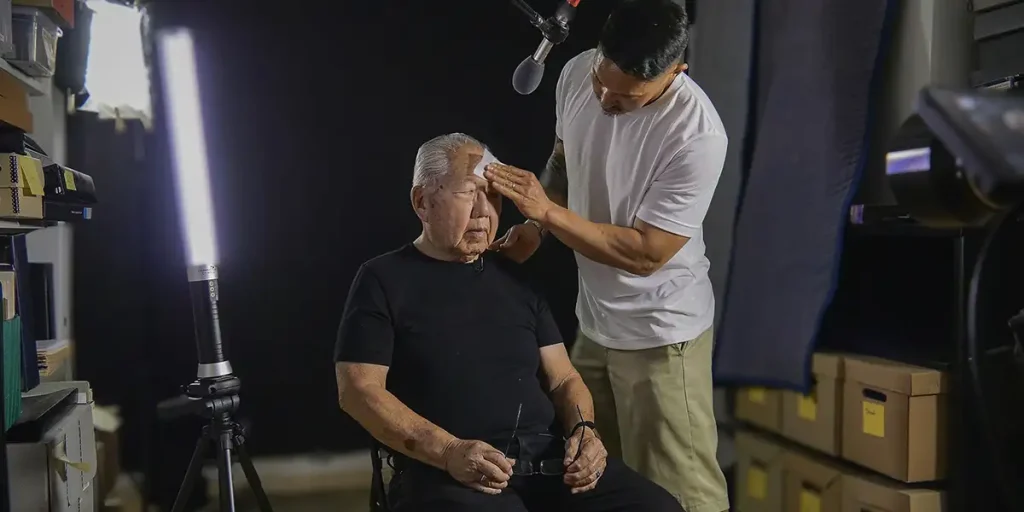In his enlightening and deeply personal documentary Third Act, Tadashi Nakamura tells the story of his remarkable father Robert.
Director: Tadashi Nakamura
Genre: Documentary
Run Time: 93′
Sundance Premiere: January 26, 2025
U.S. Release Date: TBA
U.K. Release Date: TBA
Third Act tells the story of Robert A. Nakamura, a filmmaking pioneer you have probably never heard of before. Known as the godfather of Asian American media, he has led a remarkable life. He was a professor at UCLA. He founded Visual Communications (VC), the first Asian American media arts organisation. And with 1980’s Hito Hata: Raise the Banner, he became the first director of a feature made by and about Asian Americans.
It is only right that Nakamura’s story is being told in a documentary. And who better to tell his story than his son Tadashi, who followed his father into filmmaking and now has a young son of his own?
However, as Tad began working on this project, Robert was diagnosed with Parkinson’s disease, and everything changed. “My whole life, I always knew I had to make a film about my dad,” says Tad early on. But with it came the knowledge this will likely be their final project together. And as Tad explores Robert’s life, starting with how he was forced into a Japanese internment camp at 6 years old, it turns into something with much deeper meaning for both men.
Premiering in the US Documentary Competition at this year’s Sundance, Third Act shines a deserved spotlight on a figure lesser known outside the Asian American community but who paved the way for others to tell their stories. It also represents the continuation of a tradition. When Robert was Tad’s age, he made a documentary that featured his Japanese father (Tad’s ‘Jiichan’) called Wataridori: Birds of Passage. It gave Tad a greater understanding of his grandfather and what he went through, something he hopes his son Prince will experience.

But Third Act ended up being seven years in the making, with many changes during that time. The biggest is the illness that has formed the third act of Robert’s life (hence the movie’s title) and has led to Tad examining their unique relationship whilst coming to terms with an impending loss. The result is a documentary that becomes an exceptionally personal project for both subject and director, father and son. It is reverential towards the elder Nakamura but never tips into being overly simplistic. There are tough reveals, things that Tad never knew about his father and his long-term depression, and emotional moments as Robert’s health begins to decline.
Then there is Robert’s internment at the concentration camp Manzanar, which forms a dark moment in US history. Nakamura was one of 120,000 Japanese Americans who were villainised, persecuted and uprooted during World War II. He went on to document and dramatize his experience, with Tad matching scenes of the camp from his father’s documentary Manzanar with more recent footage. We also delve into Robert’s life afterwards. The racism encountered in post-war LA, his feelings towards Jiichan and what he describes as “the ultimate self-hatred… wanting to be someone else.” It set him on a course to find his identity through photography, then through the Asian American movement that allowed him to establish VC and make Hito Hata.
Meanwhile, young Tad was searching for his identity too. He was born into filmmaking, having had his birth announced on a slate and a cameo in Hito Hata at just two weeks old. “That was the start of my journey as Bob Nakamura’s son, the kid destined to fulfil his father’s legacy,” Tad narrates. But that came with expectations and pressure that he pushed back on initially, as he tried to be an athletic All-American disconnected from his roots and culture. Father and son turn out to be incredibly alike.
There are places where Third Act becomes a very straight documentary, complete with sit-down interviews and very explanatory narration. However, the rest of Tadashi Nakamura’s film is a fascinating look into a significant figure. It tackles finding Asian American identity, grief and the scars of the past through a father and son bond. One confronts his anxiety over who he would be without his dad, the other the scars of Manzanar.
This familial bond and connection is where Third Act is at its most enlightening. And it’s because Tad has managed to capture the passage of time within his family. Prince grows up on camera and eventually welcomes a baby sister. Traditions like UCLA football games and trips to Hawaii gain extra poignancy, as they may be Robert’s last chances to experience them, whilst the next generation experiences them for the first time. These glimpses allow for a reflection on parenthood and legacy, which enforces what the deeply personal Third Act is really about. As Robert says when mentioning a project he wanted to make about Jiichan, this film is “less history, more soul.”
Third Act: Movie Plot & Recap
Synopsis:
Tadashi Nakamura explores the remarkable life and career of his father Robert A Nakamura, known as the godfather of Asian American media, after Robert is diagnosed with Parkinson’s disease.
Pros:
- A fascinating film about a significant figure who is finally getting the spotlight he deserves.
- Makes clear the significance of Robert A Nakamura’s work (with the help of archival footage).
- The personal aspect, particularly the father-son bond, is enlightening.
Cons:
- It’s a very straight documentary in places.
Third Act had its World Premiere at the Sundance Film Festival on January 26, 2025.

